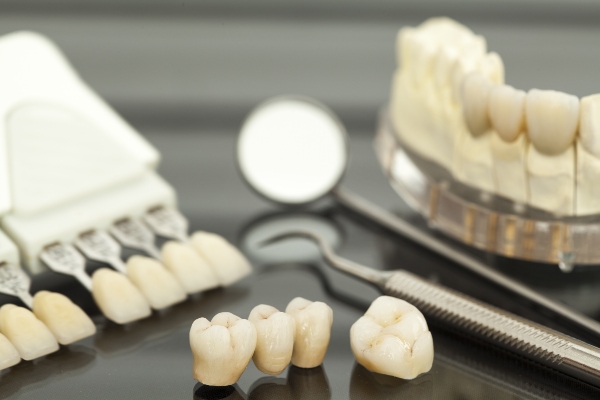How Long Do Dental Implants Last
 Many dentists refer to dental implants as the “permanent tooth replacement option,” and while this descriptor is not necessarily inaccurate, it is not completely true, either. The longevity of a dental implant depends on several factors, including a patient’s oral health, lifestyle habits, dental hygiene practices, and diet, to name a few. Patients who are considering dental implants should not only understand what they need to do to preserve the prosthetics but also what factors may cause the implants to fail.
Many dentists refer to dental implants as the “permanent tooth replacement option,” and while this descriptor is not necessarily inaccurate, it is not completely true, either. The longevity of a dental implant depends on several factors, including a patient’s oral health, lifestyle habits, dental hygiene practices, and diet, to name a few. Patients who are considering dental implants should not only understand what they need to do to preserve the prosthetics but also what factors may cause the implants to fail.
The average lifespan of dental implants
With good oral hygiene habits, such as brushing, flossing, and visiting the dentist at requisite intervals, dental implants have the potential to last a lifetime. However, it is important that patients are able to distinguish between the implant itself and the crown.
The dental implant is a titanium post that fuses to the jawbone and provides unwavering support to the abutment, or crown. With proper care, the post can remain intact for the duration of a person’s life. The crown, however, may require replacement after 10 to 20 years of normal use. Everyday stressors such as chewing and clenching, combined with the deteriorative nature of certain foods and beverages, can cause a crown to wear down to the point where it needs to be replaced.
Factors that may cause dental implants to fail
Though abnormal, a dental implant can fail. The top three factors that cause implant failure include the following:
- Failed osseointegration: Failed osseointegration occurs when the bone fails to grow around the dental implant, thereby affecting the security of the implant. This is often the result of poor bone quality.
- Peri-implantitis: Peri-implantitis occurs when the gum tissue and bone around the implant become inflamed due to excessive biting forces or bacterial infection. If left untreated, the condition can result in implant failure.
- Lifestyle habits: Certain lifestyle habits, such as smoking, poor oral hygiene, and misusing the implant can also result in premature failure or implant rejection.
Other factors may affect the longevity of dental implants as well. For instance, pre-existing or newly developed medical conditions, such as diabetes and cancer, can increase a person’s risk of dental implant failure. Implants that are subject to a lot of stress, such as those located at the back of the mouth, may fail more quickly than those at the front of the mouth. Finally, an implant that is placed in a jawbone that does not provide adequate support may fail quickly, if it does not fail right away.
Preventing implant failure
It is almost always possible to prevent implant failure with good oral hygiene, regular visits to the dentist, and a diet that is rich in healthy foods and devoid of harmful ones, such as hard candies and excessively acidic substances. If a patient does not have adequate bone support, the dentist should perform a bone or tissue graft before performing the procedure. The patient and dentist should also give the implant plenty of time to fuse to the jawbone before moving onto the next step of implementation.
Conclusion
Implants have the potential to last a lifetime. Talk to a local dentist about what you can do to extend the life of your dental implants.
Request an appointment or call Martin Dentistry at 209-299-7907 for an appointment in our Stockton office.
Related Posts
Dental implants are an effective and modern way to go about replacing missing teeth. If you are missing a tooth, you are not alone in your predicament; most people lose one or more of their permanent teeth over the course of their lives. People lose teeth due to trauma to the face, aging, or oral…
Dental implants are an increasingly popular choice for individuals with missing or damaged teeth. They offer a variety of benefits over traditional dentures or bridges. However, they can also come with challenges, and not everyone will benefit from the procedure. This article will explore the pros and cons of dental implants to help you make…
Dental implants are effective, long-lasting artificial teeth. Implants are surgically attached to the jawbone to look and function like natural teeth. As a result, patients can chew, talk, and laugh without worrying about dentures slipping. They also improve oral health. This article explores when and why to get implants and the qualifying factors for treatment.Patients…


